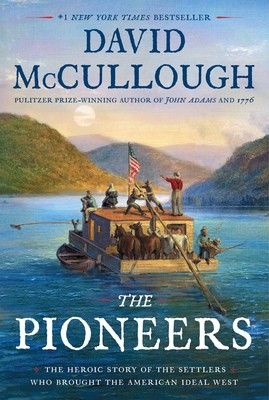Several of my husband's ancestral families pioneered in Ohio around the time covered by McCollough's history--after the Revolutionary War, through the War of 1812, and into the 1840s/50s.
Hubby's ancestors weren't famous or well-known, just farmers and families who felt compelled to go West as a result of Ohio fever. Some received bounty land on the frontier as a result of military service to the new nation and eagerly arrived to clear away timber so they could plant crops.
Here's a bit of what McCollough says about the background of this historic movement in which my husband's ancestors participated.
Seeking Fertile Farmland Out West*
As the Revolutionary War ended, financial panic set in and farmers in the fledgling United States were hit hard, sometimes imprisoned due to debts they had no way to repay.
Farmers from New England (and other areas) were increasingly looking west for what they heard was an almost too-good-to-be true area for farming along the Ohio River. Pamphlets and newspapers highly touted Ohio as a place so heavily wooded that the land was obviously very fertile. Many accounts spoke of the great abundance of turkey, deer, bison, and fish.
McCollough shows us how the early settlers left New England late in 1787 and, near Pittsburgh, boarded the galley Mayflower (yes, renamed in homage to the Pilgrims) to float through the Ohio River to a likely landing place. Slowly but steadily, these and later pioneers with Ohio fever cleared woodlands, planted crops, built homes, and founded towns.
McCollough vividly describes their hopes and fears, confrontations with Native American tribes, death from smallpox and other diseases, and the struggle of trying to live through the harsh winters--no doubt what my husband's ancestors experienced in Ohio more than 200 years ago.
Denning Caught Ohio Fever
Job Denning Sr, hubby's 3d great-grandpa, was one of the early "Ohio fever" settlers in what became Adams county, Ohio. He was probably born about 1775, possibly in Massachusetts, and he died in 1836 in Adams county. (His birth year is based on the age transcribed from his gravestone, which is barely legible today.)
 |
| "A History of Adams County" - excerpt from page 437, with Job Denning highlighted as one of the first to build a cabin outside the stockade. |
- Denning was among the first settlers to build a cabin outside the stockade in Manchester, circa 1795-6. (Excerpt from the book, above, is my source.)
- When the court met on September 12, 1797, for its first-ever session in Manchester, Denning was named "court cryer."
- Denning was soon named one of two constables for Manchester.
- He also applied for and was granted a tavern license by the court. (I don't know whether he actually operated the tavern.)
- On May 17, 1804, Denning purchased lots in West Union township, Adams County, for $9.
- Denning was appointed a county commissioner on November 17, 1806, a post he held until he resigned in March, 1814.
- In 1810, he received the contract to haul stone from the quarry for the building of the new Presbyterian Church in West Union.
- Denning served as an associate judge for Adams county, with a term expiring in January, 1828.
- In 1831, he was named a commissioner on road works in Adams county.
Many thanks to Amy Johnson Crow for this week's #52Ancestors prompt.
*At the time, Ohio really was the Western frontier. These days, most people would consider it the midwest. Except my husband, who insists that his hometown of Cleveland, Ohio, is an Eastern city. Sorry, honey, Ohio is not in the East! ;)


No comments:
Post a Comment